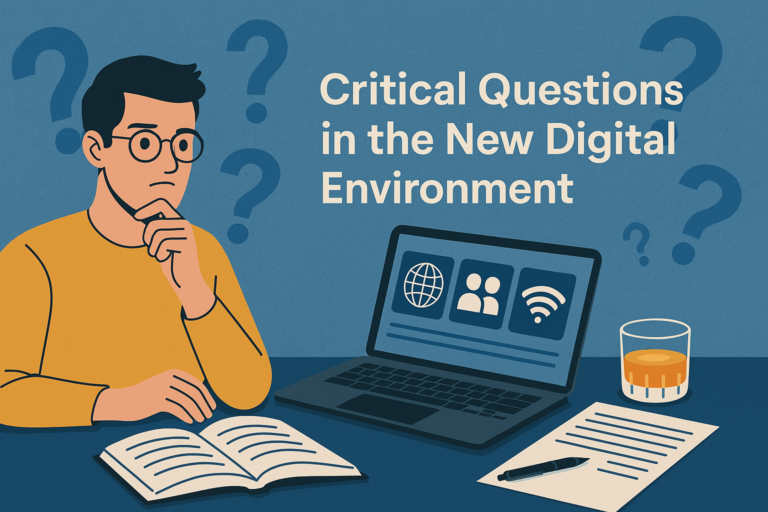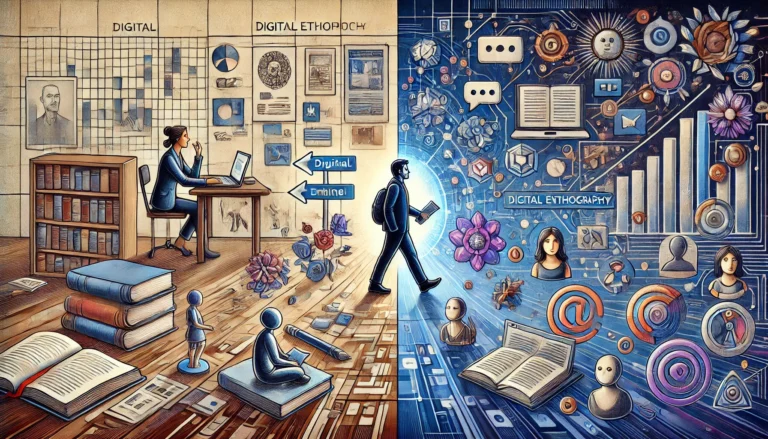
Digital ethnography allows us to explore different ways of being in the field of the social sciences. But how is digital ethnography received among those practicing traditional ethnographic methods, and to what extent is it accepted in the scientific community? Moreover, do all these questions matter for ethnography, or do we need to have a broader perspective on the reliability and validity of new field methods? This week’s class discussion about objectivity and subjectivity in the sciences, particularly the rise of quantitative research and the so-called decline of qualitative research, made us revisit these questions.
I encountered the field of ethnography for the first time in my educational life, and for the first time in a long time, I stepped into a field like digital ethnography, which I had no prior knowledge. From the first week, I hesitated to dive into a field that was completely empty in my mind and to take the responsibility of leading this course. I had to lead the whole discussion while I was trying to learn everything from scratch and trying to figure it out. To overcome this, I tried to focus on the points in the texts I read that I could relate to my own knowledge set. Accordingly, the discussion would focus more on knowledge production, the social sciences debate, and objectivity.
This week’s session was the first discussion led by someone from the class. So, hopefully, for the others, it was an example of leading, or they saw what they focused on from my shortcomings and mistakes. I always find it more tiring and challenging to be the first to try something, so I prefer to run away, but this time I took the responsibility. In fact, during the process, I realized that I didn’t need to feel burdened at all; this was a discussion that was undertaken together with the class. Thanks to my friends’ contributions, the responsibility I felt was replaced by a nurturing conversation.
Before I started the discussion, I was a bit worried that someone was working on quantitative research among us, that what I was saying would make someone uncomfortable, or that it would not attract anyone’s attention. However, when I started discussing the topic, I was relieved that almost everyone in the class had something to say about the topic and that everyone was engaged, which helped me to manage the rest of the session more comfortably. The fact that everyone came from different backgrounds contributed a lot to the discussion.
The interdisciplinary nature of the social sciences became more apparent to me thanks to this course. As someone who has focused her readings on political and sociological theories until today, I thought I would learn a lot of new and completely different information when I switched my master’s degree to history but seeing that the social sciences are intertwined. Ethnography intersects with many fields, reminding me of the importance of interdisciplinary work. I realized I could combine many theories I have learned with digital ethnography to formulate more substantial questions.
I realized that the “habitus” theory of Pierre Bourdieu, a famous French sociologist, is an essential theory we can apply to ethnographers and participants in the field. Another critical sociologist and theorist, Michel Foucault’s ideas on power and knowledge production, especially his theories that everything in society is socially constructed, were discussed in the context of digital ethnography and post-humanism. Another point of intersection was the determinism of the relations between states and political power in digital fieldwork and all other scientific production processes. This allowed us to consider the digital field not only as a field but also as a political space that determines the participants’ behavior. The intersection of ethnography and politics was touched upon by discussing political power’s impact on digital identities. In this way, we observed that ethnography can touch many fields simultaneously. This reminded us again that we cannot think of digital ethnography and the digital field as separate from the social, political, and cultural spheres, and the interaction in this field has social, political, and cultural meanings.
Discussions took place in this seminar, which focused on digital field study and ethnography methods, and different clashing points emerged. Some of the key discussion points that took place during the seminar were:
1. Qualitative research in this quantitative world
- Will the qualitative method survive and retain its value in the face of the increasing importance of quantitative research?
- Are the methodologies used sufficient to prove that a study is scientific? Is validity and reliability and a data-centric approach the only way to make a study scientific? Is the quantitative research method alone sufficient to prove the objectivity of a study?
- Is it a necessity to be objective? How can we eliminate dichotomies such as subjective vs. objective, scientific vs. non-scientific?
2. Identity in the digital field
- How are digital identities shaped within the framework of power and control mechanisms in social media, and how do these mechanisms affect identity construction? What do we learn about digital identities from Erving Goffman’s backstage theory?
- Are identities becoming increasingly differentiated and one person is divided into multiple identities or is everyone becoming more and more alike?
- Why do people create fake accounts, or why do they want to be anonymous? What are the social, cultural, and political reasons behind this?
- How do dating apps like Tinder shape the relationships we build with people?
3. Human no more
- Are we in a post-human era with AI and VR technologies that continue to evolve, or is it still human that is important for digital ethnography?
- As Foucault says, is human perception a fluid concept that transforms over time? How should Foucault’s idea be reconsidered in the digital age?
This discussion taught me how challenging it is to steer the course and the discussions during a seminar. Apart from that, the collective intellectual engagement made me realize how much dichotomies shape my own world of ideas. At the same time, thanks to the experiences of my colleagues who have worked on ethnography before, I learned essential points about how to conduct a digital ethnography study, what to pay attention to, and what not to do. As someone who believes in the power of peer learning, I look forward to what I will learn about digital ethnography fieldwork in the coming days.
Author: Ayşenur Özel


